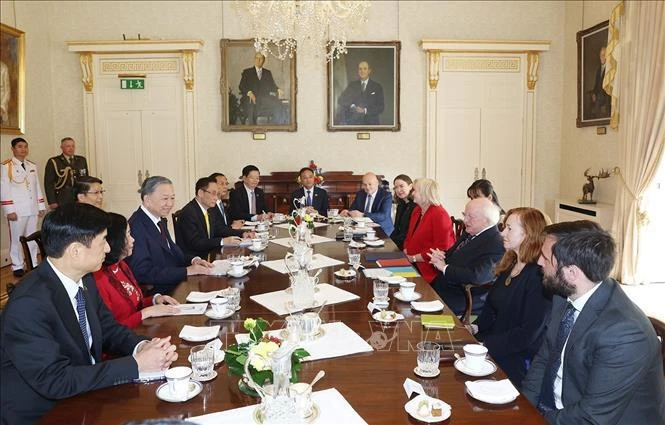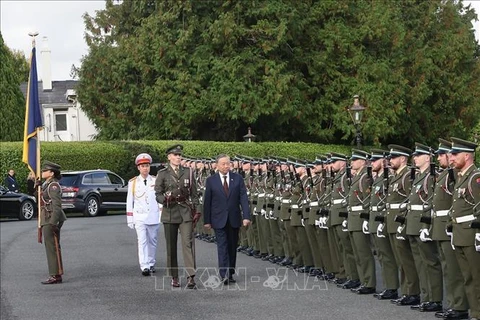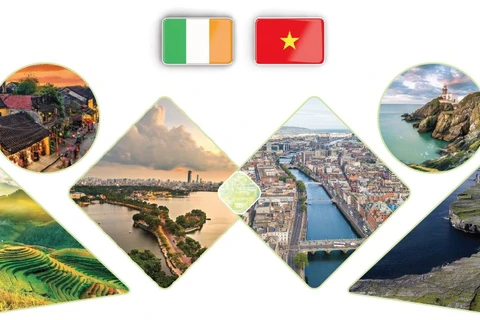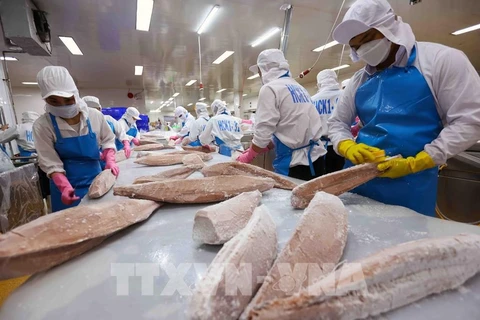
Dublin (VNA) – General Secretary of the Communist Party of Vietnam Central Committee and State President To Lam held talks with President of Ireland Michael Higgins in Dublin on October 2, as part of his state visit to the European country from October 1-3.
Welcoming his guest’s first visit to Ireland, Higgins highly evaluated Vietnam’s foreign policy and affirmed that his country respects Vietnam’s position and role in Asia-Pacific.
The two countries share many similarities in the struggles for national independence, and there are no areas or topics that they are unable to discuss or cooperate in, he said.
Higgins recalled his visit to Vietnam in 2016, noting he is impressed with the Southeast Asian nation’s achievements in socio-economic development, international integration, and realisation of the Sustainable Development Goals in recent years. He also expressed his sympathy with Vietnam over the heavy consequences of Typhoon Yagi.
Lam stated that Vietnam attaches importance to developing its friendship and multifaceted cooperation with Ireland. Vietnam highly appreciates the Irish Government giving priority to Vietnam in its development cooperation policy within the framework of the “Global Ireland: Delivering in the Asia Pacific Region to 2025” strategy.
The Vietnamese top leader expressed his wish that Ireland will continue provide development assistance for Vietnam in the prioritised fields such as green growth, response to climate change, environmental protection, information technology, digital transformation and sustainable development.
To enhance mutual political trust and understanding, the two leaders agreed to step up the exchange of delegations at all levels, especially high-level ones, and actively carry out existing cooperation mechanisms.
Lam was pleased to announce that the Vietnamese Government has decided and is implementing procedures for the opening of the Vietnamese Embassy in Ireland.
Both leaders voiced their belief that this decision will herald a new development stage for the bilateral relations for the sake of common interests of the two countries' people.
Regarding economic, trade and investment cooperation, the two leaders affirmed that this is an important pillar of the bilateral cooperation and is developing positively when two-way trade turnover is expected to reach 3.5 billion USD in 2024. The two sides need to effectively capitalise on the EU-Vietnam Free Trade Agreement (EVFTA), promote trade-investment connection, support the business communities of the two countries; and strive to increase the trade turnover between the two countries to 5 billion USD by 2026 when the two nations will celebrate the 30th founding anniversary of their diplomatic relations.

The Irish President emphasised that Vietnam is Ireland's leading trade partner and that there is still ample room for cooperation between the two countries; acknowledged Vietnam's proposal to accelerate the ratification of the EU-Vietnam Investment Protection Agreement (EVIPA) to expand cooperation and investment opportunities between the Vietnamese and Irish business communities; and wished that Vietnam will facilitate Ireland's export of high-quality agricultural products and food products.
The two sides welcomed the establishment of a strategic partnership on higher education between the Vietnamese Ministry of Education and Training and the Irish Department of Further and Higher Education, Research, Innovation and Science, as well as the signing of a Memorandum of Understanding (MoU) between the Vietnam National University, Hanoi and leading universities of Ireland. The two leaders agreed that this is a priority area of cooperation between the two countries, thereby helping to improve the quality of training, develop high-quality human resources, promote scientific research and innovation in Vietnam.
To enhance mutual understanding and connections between the two countries' people, the two leaders agreed to promote people-to-people exchanges, cultural and artistic cooperation, tourism cooperation, and partnerships between localities of Vietnam and Ireland.
The two sides agreed to create favourable conditions for the two countries' nationals to live and work, contribute to each other's socio-economic development process, and promote their role as a bridge for the friendship between Vietnam and Ireland.
Within the framework of the talks, the two sides discussed regional security issues of shared concern, such as the situation in Ukraine and the Middle East. They called on all sides to protect civilians, conduct dialogue, and resolve conflicts by peaceful measures on the basis of international law and the basic principles of the United Nations Charter.
They concurred to strengthen cooperation at multilateral forums such as ASEAN-EU and the United Nations and in various areas such as response to global challenges, climate change, food security, and ensuring supply chains.
The two sides supported ASEAN's stance on the East Sea issue in terms of ensuring peace, stability, security, cooperation and development in the region, and settling disputes by peaceful means on the basis of respecting international law, especially the 1982 United Nations Convention on the Law of the Sea (UNCLOS)./.






















